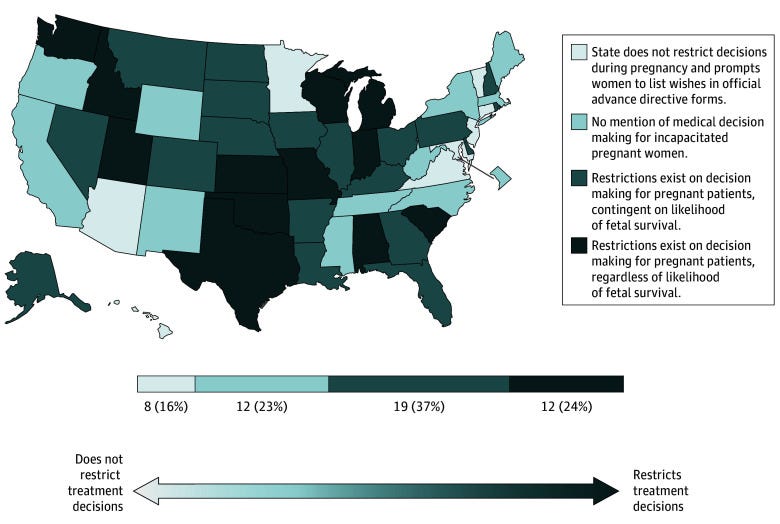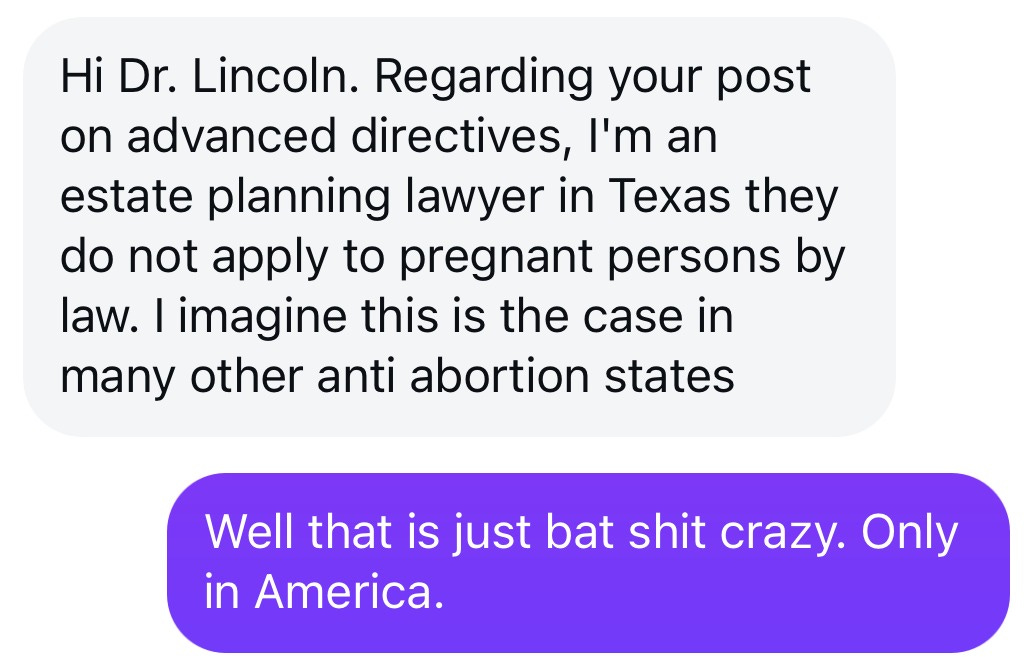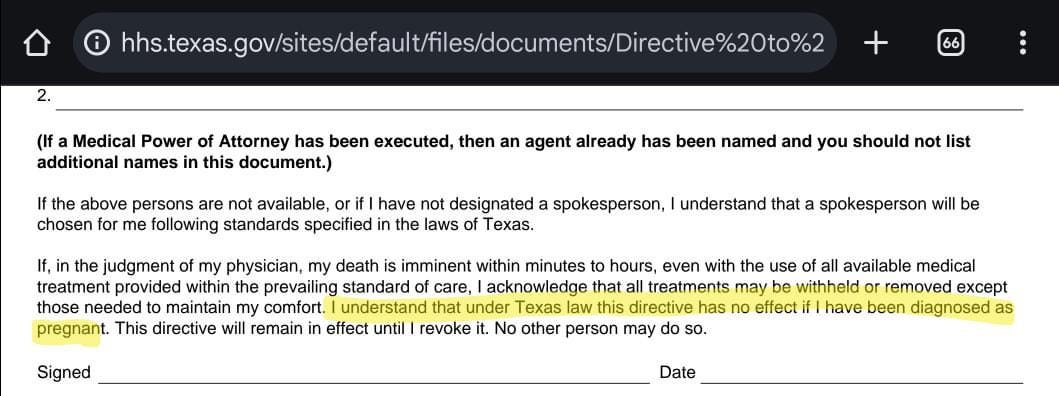Earlier today I sent out an extra edition of my newsletter talking about why it’s so important to have an advance directive if you’re pregnant. This was inspired by the tragic story of Adriana Smith in Georgia (who at 9 weeks of pregnancy suffered a stroke, was declared brain dead, but is being kept alive on life support so she can grow her fetus—without any input from her mother).
Well, imagine my surprise when someone sent me this via DM:
As you can probably tell from my reaction, I was completely caught off guard. At first, I felt embarrassed—Does everyone know this but me? How do I not know this as an OBGYN?—and then I got angry.
Angry that it’s true. Angry that I consider myself well-informed on reproductive rights and still didn’t know. Angry that if this is the reality, why aren’t we shouting it from the rooftops? Why aren’t we louder about the fact that in some places, a pregnant person can be legally reduced to an incubator—kept alive against their will?
And then I realized: this isn’t different from any other abortion ban. Because whether you’re forcing someone to carry a pregnancy to term or forcing someone to remain on life support to sustain a fetus, the outcome is the same: the pregnant person’s body and autonomy are no longer their own.
And once the baby is born? That same system often walks away. States that push these bans rarely show the same urgency when it comes to maternal health, Medicaid coverage, or ensuring those children are fed, housed, or cared for. The hypocrisy is staggering.
But I digress.
Here’s what I’ve learned. I’m livid—and I want you to know it too. Because this is part of a broader, quieter threat: fetal personhood. And the more people who understand it, the better chance we have of pushing back.
The frightening reality of advance directives in pregnancy
As I explained in today’s previous newsletter, an advance directive is a legal document that spells out your medical care preferences in case you’re ever unable to speak for yourself—like whether or not you’d want to be kept on life support if there’s no chance of full recovery.
Enter “pregnancy exclusions”
Over 30 states have pregnancy exclusions that can override your advance directive if you’re pregnant. In nine states, your wishes are flat-out invalidated, no matter the stage of pregnancy or the fetus’s chances of survival. That means if you’re incapacitated, you could be kept on life support against your stated wishes—all because you’re 6 weeks pregnant.
A study published in JAMA in 2019 looked at how different states take pregnancy into account when deciding to follow or ignore advanced directives in incapacitated patients. As you can see below, the darker the state, the worse the pregnancy exclusions. This map turned my stomach.

So here’s what I now know about pregnancy and advanced directives. It ruined my day, and it might ruin yours too—but it means once we know about it, we can give voice to it:
Nine states (Alabama, Indiana, Kansas, Michigan, Missouri, South Carolina, Texas, Utah, and Wisconsin) automatically invalidate all advance directives for pregnant people—no matter how early the pregnancy or whether the fetus could survive—forcing life support even against explicit wishes.
More than 30 states have some form of “pregnancy exclusion” in their advance directive laws, meaning your wishes may be ignored if you’re pregnant, especially regarding life-sustaining treatments like ventilation or tube feeding.
Alaska, Georgia, and Oklahoma require physicians to test for pregnancy before withdrawing life-sustaining treatment from women of childbearing age. WTF.
My conclusion: we really do hate pregnant women in this country. Certain politicians and politician-adjacent folks (yes, Elon) seem hell bent on us having more babies. They want us to have huge families, and they just seem so perplexed as to why we aren’t. Gee, I wonder if it’s because if I end up in a coma in Texas when I’m 10 weeks pregnant my family might have to watch me suffer as I am maintained on life support against my wishes?
Couldn’t be that.
What to do next
Don’t lose hope. Court victories (like in Colorado in 2021) have led to new laws removing pregnancy exclusions. They recognize that they violate constitutional rights to refuse unwanted medical treatment—hooray for human rights!
Here’s what you can do if you’re pregnant or planning to become pregnant to protect yourself:
Get informed: Know your state’s laws when it comes to advance directives in pregnancy.
Talk to your healthcare team and loved ones: Make your wishes crystal clear. Even if the law isn’t on your side, your care team and family should understand your values and preferences.
Advocate for change: Laws can change! Contact your legislators (here) and support organizations fighting for patient autonomy. Speak up. Share this on social media. Tell your friends. We can’t fight what we don’t know is happening —which even I didn’t until earlier today.
Document everything: Even if your advance directive could be invalidated, it’s still worth completing one and stating your wishes about pregnancy. It helps guide your loved ones and medical team in tough situations. Consider including language about how you want it to be followed even if you are pregnant. While this may not guarantee it will be, it certainly can’t hurt in a court of law if the situation arises.
Am I still embarrassed that I didn’t know how widespread pregnancy exclusions are? No—and you shouldn’t be either if this is new to you. I’m grateful to the readers and followers who, like the person who DM’d me, are paying attention, asking questions, and teaching me right alongside the learning I’m trying to share.
Let’s work to lift up these messages and fight for what truly are just basic human rights.
Until next time,
Dr. Jen







I'm in Illinois just wrote my state reps about this. Horrified this happens.
This is great info. To add something additional in regards to the specific application of GA statute, I'm not sure the interpretation being promoted by anti-choice groups is correct. My reading of GA Code § 31-32-9 is that it just says where there is a woman pregnant with a non-viable fetus physicians must provide a written certification of the “state of permanent unconsciousness” and then make efforts to consult with next of kin regarding use of life-sustaining procedures. The GA model advanced directives have a specific location where you can sign that you want your advanced directive complied with when you are pregnant with a non-viable fetus.
So, agreeing with you this is bad and just adding to the conversation that I think anti-choicers are disentgenuously claming that the heartbeat bill has nothign to do with Adriana Smith's treatment. Emory healthcare has released a statement about the decision which includes express reference to the abortion ban, “Emory Healthcare uses consensus from clinical experts, medical literature, and legal guidance to support our providers as they make individualized treatment recommendations in compliance with Georgia’s abortion laws and all other applicable laws.”